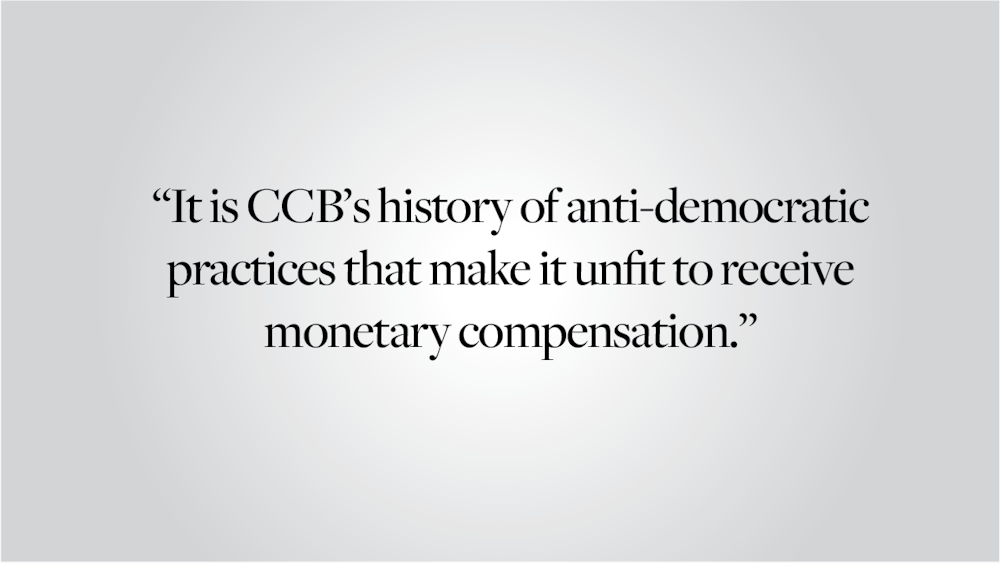The purpose of the Class Coordinating Board is to plan events. Yet, despite being an organization that is supposed to represent the student body, CCB has a track record of being undemocratic. I find it concerning that members of CCB are now attempting to compensate themselves using University funds. CCB Senior Co-Presidents seek to hold a referendum on the issue during the coming Spring Elections. I respectfully ask them to abandon this misguided initiative and, if they don’t, I urge the student body to quash it at the ballot box.
CCB’s history of anti-democratic practices makes it unfit to receive monetary compensation. Until mid-February of 2021, the organization had an “internal voting procedure” written into its Constitution where the board could select in advance the candidates and their positions, leading to multiple uncontested elections This system was justifiably criticized by former UCS President Jason Carroll ’21, whose op-ed in the Herald pointed out the policy’s “dimming effect on competition.”
Even though the current iteration of the CCB constitution makes no mention of the previous once-infamous internal voting procedures, the mere existence of such a prima facie undemocratic amendment in the first place signifies a concerning level of moral turpitude. The fact that members of the organization saw nothing wrong with the amendment until a fellow student called them out only compounds these concerns.
Even today, CCB’s elections are hardly competitive. During the 2023 Spring Elections, the vast majority of incumbents were re-elected to CCB by default; the only instance of an election for a CCB position with more than one candidate was for the position of treasurer for the class of ’26 — the incumbent won anyway. While this pattern may be due to a lack of interest in CCB as opposed to the remnants of their internal voting policy, allowing CCB members to stick their hands into University coffers when the student body had no real choice in their election is absurd. The fact that only 40% of respondents to the Herald’s Fall 2023 poll approve of CCB further weakens the group’s mandate to have its members paid by the University.
One might argue that the lack of electoral competition is due to financial inaccessibility and that financially supporting members of CCB would allow for increased diversity in the group. According to CCB Co-President Logan Torres ’24, “Students who come from diverse backgrounds need financial support. If I was financially supported (by CCB), I would have been able to not work my three other jobs on top of this role.”
This reasoning is faulty. It’s rather cynical that CCB is using social equity as a reason to pay its members when, as far as I can glean from CCB’s public statements, compensation would be doled out to all members as opposed to being need-based. If it were an issue of social equity, why not build a financial aid program that targets resources specifically for students in need? That a student has to work three jobs to put themselves through college points to a failure of the University’s financial aid system. Yes, the University needs to provide more financial aid, but wages are not the solution, especially given CCB’s history of pre-ordained elections with “abysmal” turnout rates.
Sure, one might point out the size of the University endowment — who cares if CCB dips its hand into the pot? Contrary to popular belief, however, the University endowment isn’t infinite. As much as I would love it if President Paxson threw a couple grand my way, we shouldn’t encourage frivolous spending that could do more good elsewhere. Instead, resources would be better allocated towards more robust financial aid packages that help the whole student body instead of a small cadre of campus event planners.
Victor Chang ’27 can be reached at victor_a_chang@brown.edu. Please send responses to this opinion to letters@browndailyherald.com and other op-eds to opinions@browndailyherald.com.





